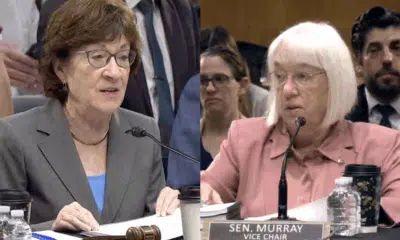News from the South - North Carolina News Feed
Asheville’s main water source continues to clear; contract awarded for Army Corps of Engineers filtration system • Asheville Watchdog
Asheville’s North Fork Reservoir will get another turbidity-reducing mineral treatment next week, as the lake’s murkiness continues to decline.
At Friday’s daily Tropical Storm Helene briefing, Asheville Water Resources spokesperson Clay Chandler said the key turbidity level dropped again since Wednesday, falling below 17 Nephelometric Turbidity Units (NTUs) by Friday morning, about a 1 point drop from Wednesday. Also, the amount of lake water the city is able to push into the system for filtration rose from 17 million gallons to 19 million, also a good sign as the city slowly heads toward providing potable water again.
The ultimate goal is to get turbidity down to 1.5-2.0 NTU, which would allow for optimal filtration.
Helene devastated the city’s water system Sept. 27, knocking out transmission lines from North Fork, which provides 80 percent of the city’s drinking water, and leaving the 350-acre lake a murky mess. Chandler said North Fork’s output capacity hovered between 17 million and 19 million gallons Thursday, until a 16-inch water line on Patton Avenue broke in the afternoon.
“And if you were anywhere in the area of Patton Avenue yesterday afternoon, you saw water on the street, but that’s been fixed,” Chandler said. “So that’s a good example that our ability to push treated water into the system is going to depend, obviously, on turbidity continuing to fall and no major breaks in the system.”
The city is pursuing a two-pronged approach to restoring potable water: reducing the reservoir’s turbidity through the installation of turbidity curtains to still the water, coupled with a four-day application next week of aluminum sulfate and caustic soda; and pursuing the installation of an Army Corps of Engineers mobile treatment facility at North Fork to treat high-turbidity water.
“They have verbally awarded the contract to a contractor for that project,” Chandler said of the Army Corps of Engineers. “That contractor will be on site early next week for a site visit, and the build-out will begin shortly after that.”
The timeline for that project’s completion remains late November or early December. Chandler explained that while the equipment, which allows filtration of high-turbidity water, will come in on trucks and is considered mobile, it still requires some construction, as well as determinations on what size of equipment is most appropriate.
“There is a lot of piping that’s going to have to be installed,” Chandler said. “Just right now, our estimate is that the piping is probably going to take up most of the build-out time. It’s not just a few feet — it could be as much as a couple of thousand feet.”
Additionally, the units have to be laser-leveled when set into place, as even a small amount of unevenness could cause problems or even damage.
Asheville Watchdog asked Chandler why the city initially said it could not process North Fork water until the turbidity level had dropped to 1.5 to 2 NTU but is now filtering 19 million gallons a day of water with 17 NTUs.
“We’re able to push treated water into the system due to the change not only in the overall level of turbidity, but also in the density of the turbidity-causing material,” Chandler said after the briefing. “Initially, the turbidity was thick mud, which would obviously wreak havoc on our filters. Since then, the overall level has lowered and the particles have ‘slimmed up,’ so to speak, so they can be washed out of the filters.”
By comparison, the water in the city’s Bee Tree Reservoir in Swannanoa remains a thick mud with a turbidity in the 140 NTUs range, down from more than 200 initially, he said.
The city needs North Fork to reach 27 million gallons of water per day being treated and sent out to fully pressurize and flush the system. That flushing and repressuring could take two to three weeks, Chandler has said previously, so a return to potable water could still not come until mid-December.
Chandler also noted that North Fork’s 20,000-plus acre watershed sustained “significant tree loss” during Helene, including from a possible tornado that twisted off trees half-way up.
“We don’t expect the quality of the water to decline,” Chandler said. “The tributaries that are pushing water into the North Fork Reservoir now are crystal clear.”
Starting next week, a contractor will begin the city’s third application of aluminum sulfate and caustic soda at North Fork. The materials help clay particles coagulate and sink, leaving clearer water to filter.
Asheville Watchdog is a nonprofit news team producing stories that matter to Asheville and Buncombe County. John Boyle has been covering Asheville and surrounding communities since the 20th century. You can reach him at (828) 337-0941, or via email at jboyle@avlwatchdog.org. The Watchdog’s local reporting during this crisis is made possible by donations from the community. To show your support for this vital public service go to avlwatchdog.org/support-our-publication/.
Related
The post Asheville’s main water source continues to clear; contract awarded for Army Corps of Engineers filtration system • Asheville Watchdog appeared first on avlwatchdog.org
News from the South - North Carolina News Feed
Asheville’s Urban Forestry Commission speaks for the city’s trees. It hasn’t met since Helene. • Asheville Watchdog
Asheville’s Urban Forestry Commission met on Sept. 3, 2024, with an agenda that, if unexceptional, represented the kind of work the volunteer advisory board had done since its inception at the beginning of the decade.
Its members heard an update from Keith Aitken, who a year earlier had become Asheville’s forester after the UFC successfully lobbied the city to create the position. They voted to recommend the approval of a landscaping plan for a Duke Energy substation on Rankin Avenue. And they discussed the Urban Forest Master Plan, for which City Council had approved funding that June. Local environmentalists, including the UFC, had long advocated for a roadmap for protecting and growing the city’s canopy; now one was finally on the way, with a public tree inventory and satellite analysis ready to begin.
Then Tropical Storm Helene tore the urban canopy asunder. In its aftermath, the city paused work on the Master Plan and indefinitely suspended all advisory boards, including the UFC.
Eleven months later, the UFC still has not reconvened, the Master Plan is still on hold, and their purgatorial state is causing growing alarm among advocates who see this period of recovery as a particularly crucial moment for Asheville’s trees.
Though local tree loss has not been thoroughly quantified, the North Carolina Forest Service has estimated that 40 percent of trees in Buncombe County but outside the city limits were damaged; one analysis of hundreds of fallen trees within Asheville found that the city’s medium-to-large hardwoods fared particularly poorly. Meanwhile, one of the city’s largest contiguous forested areas is on the chopping block, as the University of North Carolina Asheville is pursuing a proposal to replace 45 wooded acres with a 5,000-seat soccer stadium and surrounding development.

“Of all the times when you really need (a master plan), you’d think now would be the time, when we’re trying to think of how to prevent the next disaster caused by too much pavement and too much building and not enough stormwater absorption and not enough green infrastructure,” said Steve Rasmussen, a member of the volunteer Tree Protection Task Force for Asheville and Buncombe County, which has worked closely with the UFC.
When the UFC formed in 2020, it was part of a focus on trees that local environmentalists felt was sorely needed; a study commissioned by the city the previous year had found canopy loss of more than 6 percent coinciding with population growth over the previous decade. The UFC’s predecessor, the Tree Commission, had a narrower purview, as did the canopy ordinance the city had in place for decades. Between the UFC’s inception and the post-Helene pause, according to UFC documents, the city preserved more than 2.5 million square feet of canopy, planted about 400,000 more, and collected roughly $300,000 in fees related to landscape compliance rules.
Aitken, the city forester, was not available for an interview for this story, city spokesperson Kim Miller said. In an email, Miller pointed toward the creation of Aitken’s position and to the 2020 city ordinance that expanded canopy protections.
“The master plan contract remains in place as staff assesses the next best steps forward,” she said. “We will announce the restart of the planning process and opportunities for community involvement in the coming months.”
The UFC doesn’t have to meet for the plan to move forward; the city has already chosen its contractor and approved $269,000 in spending, and as an appointed advisory board, the UFC weighs in on city matters but doesn’t have decision-making authority.
But keeping the UFC dormant could deprive the public of an important conduit to city officials, one more powerful than sending an email or speaking for three minutes during a council meeting’s public comment section, Rasmussen said.
“It really helps to have an advocacy group, and for people in general it really helps to have a place to take their concerns about trees and tree protections and have them addressed. The UFC has been one of the most active of all these boards and commissions.”
Zoe Hoyle, the UFC’s most recent chairperson, said the advisory board could play an important role in engaging the public as the city continues to respond to Helene and, eventually, restarts the Urban Forest Master Plan.
“I think it’s really important that we do something that marks us out as a city” in Helene’s wake, she said. “‘Transformative’ is the word I like to use.”
Alison Ormsby, the co-chairperson of the Tree Protection Task Force, said she would have liked to see the UFC continue to meet after Helene — helping to steer the city’s recovery as it pertained to trees and green spaces and acting as a watchdog as criticism proliferated over the debris-removal practices of the U.S. Army Corps of Engineers and its paid-by-volume contractors.
“Eric North, a program manager for the Arbor Day Foundation, which administers the Tree City program, said in an email Asheville began its application last year but, like some other communities preoccupied by hurricane recovery, didn’t finish it. who could provide really useful input on storm response,” she said.
Future of city’s advisory boards uncertain
The UFC’s uncertain future is part of a bigger question the city now faces: What will it do about its many advisory boards? It had 13 active ones before Helene and two others that existed in name but hadn’t met for years. The boards have been paused largely because city staff hasn’t had time to help them run their meetings.
At a City Council meeting last week, city staff offered one path forward, a plan to keep the advisory boards on hold and reassemble some of their members into four so-called recovery boards. Assistant City Manager Ben Woody said the proposed arrangement would be more efficient, and eventually the individual advisory boards could still meet or take on tasks as the city wishes.

The city’s Boards and Commissions Realignment Working Group has proposed an alternate plan in which it would voluntarily help publicize and run advisory board meetings. Councilmember Kim Roney supported the idea, saying she believed it’s time for the boards to get back to work.
“I don’t know everything about everything,” she said. “But when we invite our neighbors to bring their professional and lived experience to the table, we can make better decisions as a council.”
But City Attorney Brad Branham threw cold water on the idea. Though he stopped short of shutting it down entirely, he said he worried about the boards inadvertently violating open meetings laws in the absence of city staff. Such an error could cause legal trouble for the city, he said.
Those close to the UFC hold out some hope that the city will entertain the Realignment Working Group idea. Hoyle said she has concerns about the recovery-boards plan. She believes UFC members would need seats on all four boards to be effective. (A draft Woody presented last week has UFC members on the proposed Economy and Infrastructure boards — but not on the People & Environment board.) And while advisory boards could still be called upon for occasional work, Hoyle worries the lack of regular structure would undermine that expectation.
“Our current members could lose interest and just disappear,” she said. “I don’t know what the mechanism will be for replacing our membership.”
To some observers, the progress on tree issues in recent years now feels fragile. Even Asheville’s Tree City USA distinction, which it held for nearly 45 years, has lapsed. Eric North, a program manager for the Arbor Day Foundation, which administers the Tree City program, said in an email Asheville began its application last year but, like some other communities preoccupied by hurricane recovery, didn’t finish it. He said the Foundation would welcome the city’s reapplication this year.
But to meet Tree City standards, Asheville would need a functional tree-focused board or department.
“We no longer fit the criteria,” Ormsby said. “Some folks have said we don’t deserve it.”
Asheville Watchdog welcomes thoughtful reader comments about this story, which has been republished on our Facebook page. Please submit your comments there.
Asheville Watchdog is a nonprofit news team producing stories that matter to Asheville and Buncombe County. Jack Evans is an investigative reporter who previously worked at the Tampa Bay Times. You can reach him via email at jevans@avlwatchdog.org. The Watchdog’s reporting is made possible by donations from the community. To show your support for this vital public service go to avlwatchdog.org/support-our-publication/.
Related
The post Asheville’s Urban Forestry Commission speaks for the city’s trees. It hasn’t met since Helene. • Asheville Watchdog appeared first on avlwatchdog.org
Note: The following A.I. based commentary is not part of the original article, reproduced above, but is offered in the hopes that it will promote greater media literacy and critical thinking, by making any potential bias more visible to the reader –Staff Editor.
Political Bias Rating: Center-Left
The article presents a detailed account of Asheville’s Urban Forestry Commission and related environmental efforts, emphasizing local advocacy, preservation, and sustainable urban planning. The tone supports environmental protection and community involvement, topics often aligned with progressive or center-left priorities. However, it remains fact-focused and refrains from overt political rhetoric or partisan framing. It highlights concerns over government delays and environmental degradation without explicit ideological critique, reflecting a measured, policy-oriented perspective consistent with a center-left viewpoint focused on green issues and civic engagement.
News from the South - North Carolina News Feed
Trump’s executive order could worsen state’s involuntary commitment system
SUMMARY: President Trump’s executive order easing removal of homeless individuals into mental health or addiction treatment raises concerns among North Carolina advocates and experts. They fear the order could worsen the overused and harmful involuntary commitment system, which already traps many without adequate legal representation or treatment in overwhelmed emergency departments. Expanding criteria for commitment to include those unable to care for themselves may increase institutionalization beyond current state capacity. Advocates argue the order criminalizes homelessness and lacks housing solutions, violating civil liberties. They call for community-based prevention, peer support, and improved services rather than widespread forced commitments, which can do more harm than good.
The post Trump’s executive order could worsen state’s involuntary commitment system appeared first on ncnewsline.com
News from the South - North Carolina News Feed
Back-to-School meals don’t have to be boring
SUMMARY: Back-to-school meals don’t have to be boring. To help kids focus and perform well, breakfasts should include protein, healthy fats, fiber, and carbohydrates. Ideas include whole wheat toast with nut butter and fruit, breakfast burritos with eggs and veggies, or veggie-filled egg muffins prepared in advance. For lunch, homemade “Lunchables” with low-sodium meat, cheese, whole wheat crackers, veggies, and fruit offer nutrition and variety. Leftover pasta with veggies and hummus or chicken salad with fruit and crackers are healthy options. Always pack water for hydration, and keep cold foods safe with at least two cold packs in lunchboxes.
Back-to-school meals don’t have to be boring. Some healthy options for your children.
https://abc11.com/backtoschool/
Download: https://abc11.com/apps/
Like us on Facebook: https://www.facebook.com/ABC11/
Instagram: https://www.instagram.com/abc11_wtvd/
Threads: https://www.threads.net/@abc11_wtvd
TIKTOK: https://www.tiktok.com/@abc11_eyewitnessnews
-
News from the South - Texas News Feed6 days ago
Rural Texas uses THC for health and economy
-
Mississippi Today3 days ago
After 30 years in prison, Mississippi woman dies from cancer she says was preventable
-
News from the South - Alabama News Feed7 days ago
Decision to unfreeze migrant education money comes too late for some kids
-
News from the South - Georgia News Feed4 days ago
Woman charged after boy in state’s custody dies in hot car
-
News from the South - Arkansas News Feed7 days ago
Trump’s big proposed cuts to health and education spending rebuffed by US Senate panel
-
Mississippi Today7 days ago
They own the house. Why won’t they cut the grass?
-
News from the South - Georgia News Feed7 days ago
Delta jet makes emergency landing | FOX 5 News
-
Mississippi News Video7 days ago
Jones County investigators work to solve 2011 cold case












































